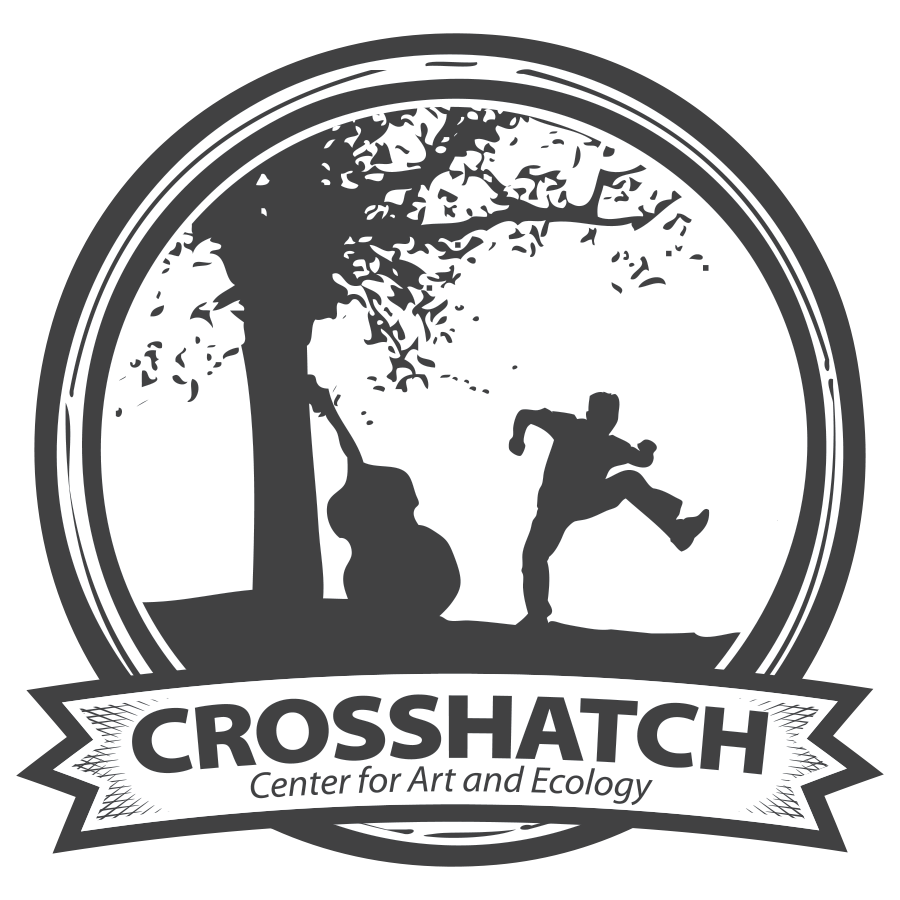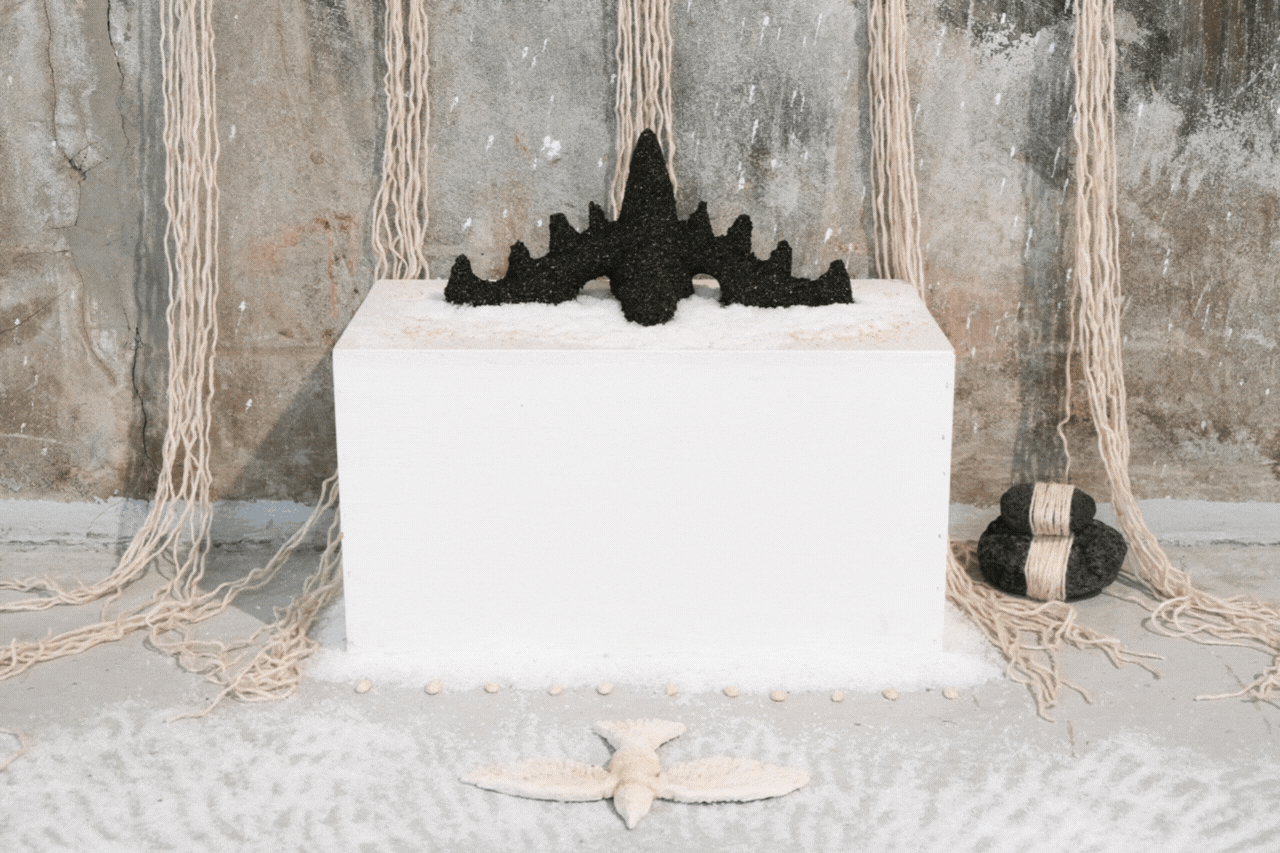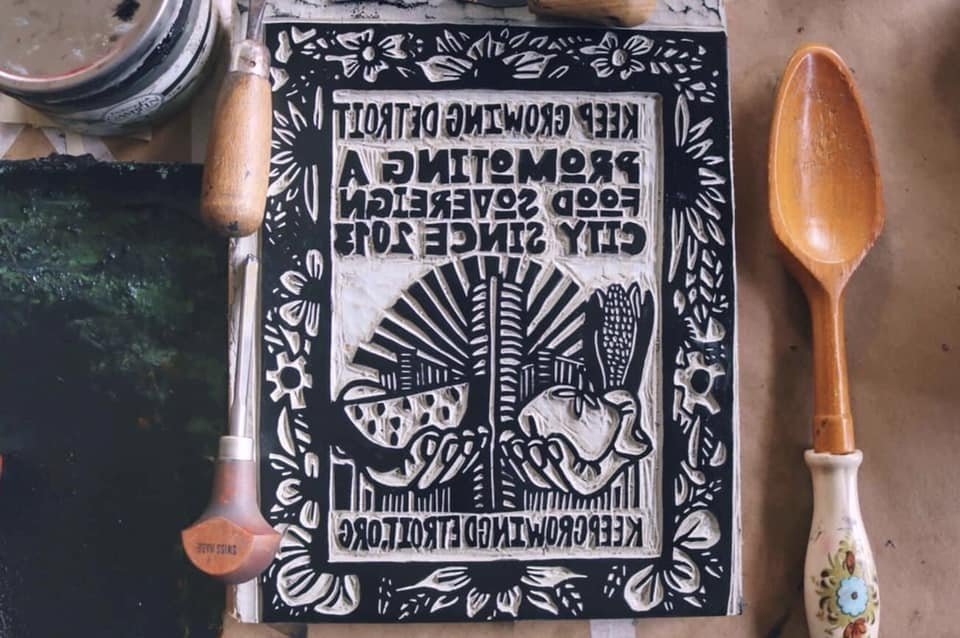Volume 3 • No. 18 • Full Moon • September 17, 2024
Born of Fire • Emily Spooner • Sand, salt, rock, Icelandic wool, and salt dough • 2023
an excerpt from
No Fine Print at 55MPH—Recognizing Crosshatch Where You See It
A linocut carved by Liza Brown for Keep Growing Detroit.
Breezy day, somewhat overcast, and the fall chill is just beginning to make itself known. I'm on the road, purposeful travels, when—wait—there's something ahead, just beyond the shoulder. It's a trailer, vehicle, or a pine outbuilding—what exactly? It doesn't matter. It's something that might be of interest to me, and I see little orange letters on a sign taped to it, just above the ubiquitous scribbles. They're supposed to say something, but as I zoom past, they aren't legible, regardless of speed.
Boo.
The only thing they effectively communicate is that I need to stop, pull over, back-track, or some other form of inconveniencing myself, one of those… before I can determine whether or not stopping was worth the inconvenience.
Well, I'm not going to stop. Before I pull over, there needs to be some indication that it's worth the inconvenience. Attempting to ascertain whether a secondhand item might be a deal or not when there's no clear price or information is working with half of what's needed. It's like depth perception askew—with only one frame of reference, I don't know where I am in relation to other things.
Before I'm driven away in curmudgeonly instincts, I'll tease out a connection—the reason I bring the sham of fine print on roadside "for sale" signs up in the first place.
Sometimes, the reason I'm on the road, moving quickly and purposefully, is for Crosshatch's work. I'm trying to tell the stories that make sense from different angles of what Crosshatch is, stands for, and makes happen. But the truth is, Crosshatch has some fine print that can be tricky to make out. That means our work is nuanced and resists one-sided paradigms and blunt oversimplification.
But it also means that it might seem tricky to understand and even more difficult to encapsulate succinctly. Maybe you've noticed invitations from this organization; invitations to show up, or dig in, help out, or respond in some way, but the whole thing isn't quite clear enough to run with. Maybe you’re not sure whether it's worth your time, or if you might even be part of the intended audience of the communication you're coming across.
That’s a problem…
The Warp — Ideas and Inspiration
|| 1 || Finding the Seam, How Small Farmers Can Thrive is a dispatch from a pecan farmer in Southern Georgia. He offers pragmatic notes on challenging work with a difficult outlook, but meaningful results. One of his recommendations is to consider NRCS funding and conservation programs. He views them not only as opportunities for small payments that alleviate some of the stresses of working with small margins, but as doorways that enable deeper care for land—which is why he’s continuing with some of the practices, even beyond their eligibility for funding.
“The goals of a good farmer should not be centered on money or building financial wealth alone. Money is a necessary tool. But money is just that, a tool. There are much easier ways to make money than farming. The primary goal of a good farmer is to find success in caring for one’s land, community, and family.”
If you’d like to know more about opportunities for small farms and other food & ecology ventures, consider attending the upcoming Small Farm Opportunity Fair and Community Microloan Launch in Kalkaska on September 23rd. More details are in the Weft below.
”When there are more farmers on the land, they are more bound to each other by similar problems and share in a belonging that can enrich the community around them. Finding the seams in which this belonging is fostered is one way we might restore local rural communities and get back some of what we have lost.”
(Finding the Seam, How Small Farmers Can Thrive)
A quick and related note: you might have noticed a quote from Ben Falk that made ripples online last week—”Rather than a million new farmers, what I picture in 50 years is a billion new gardeners.” There’s plenty of context around those words that was missing, which led Falk to clarify that both are necessary, but what’s important is wider engagement with “productive land care” by most humans and that “any model of a few producing for many is brittle.” Here’s the rest of the interview that the initial snippet came from: The Radical Act of Staying: Defying Nomadism with Ben Falk
|| 2 || Here’s the briefest of food tips: for chipotle—take a jalapeño and smoke it.
Okay, if that’s not quite the compelling narrative you’re looking for, here’s a story of more involved smoked foodways in Arts Midwest’s “Treaty Fish Co. Sustains Anishinaabe Traditions and Community Spirit.”
Which reminds me—if you reached out in response to Ripples that Lead the Healing of This World From Here wondering about the availability of fish emulsion fertilizer from the Grand Traverse Band of Ottawa and Chippewa Indians, here’s some news. The Grand Traverse Band’s food waste/fish emulsion efforts will be part of the upcoming compost crawl as one of a handful of tours in the Traverse City area. Along that tour, Traverse City’s new in-vessel composting system will be launched: a slick container that quickly composts food and yard waste. Is the system worth the $320,000+ price tag when its annual food waste processing is about the equivalent of “two and a half 64 gallon totes”? Put down your pitchforks; I’m fairly certain a modifier was mistakenly dropped from the end of that “64 gallon totes” sentence. Check out the real thing and confirm that it results in more than half of an IBC tote of processed food waste annually this Thursday, the 19th.
|| 3 || I came across Emily Spooner’s work (visuals at the top of this email) through a collaborative residency she participated in alongside Jeff Mann at Coyote Tales Farm Studios in Ontario. I’d have to cross some water and invisible borderlines to make it over there, but it seems to be an intriguing location, making the intersection of place, art, and practice clear. This short and meditative video, Chimes,is the culmination of their residency in Bancroft, Canada’s mineral capital.
The Weft — News and Events
We’re heartened by a wide-range of expressions of resilient communities and gatherings. Here’s a smattering of regional events and happenings that reflect that diversity, collected for your consideration. Choose your own adventure!
|| 1 || Small Farm Opportunity Fair and Community Microloan Launch—at Kalkaska’s Railroad Square, Monday, September 23rd, from 8:30-11am. Join fellow farmers and over a dozen farmer support organizations to connect and take the first steps toward farm funding, soil health, conservation, and business improvements. Find more information, and register, here.
|| 2 || The Third Annual Great Michigan Compost Tour is happening all week long (week of Sept. 16th) at locations throughout the state. Each of the twenty different tours offers the chance to see and learn more about different practices and strategies for reducing waste from food and yards and creating something helpful. Find more information on the program, and each of the specific tours, here.
|| 3 || The 2024-2025 Carbon Farming and Forestry Planning Cohort (taking place between November 2024 and June 2025) is recruiting now.Participation is recommended for all individuals and families seeking support for conservation and climate-smart activities on land they steward. The program provides connection opportunities with other land stewards, decision-making assistance, and guidance geared towards climate resilience. Find more information here.
|| 4 || Tip of the Mitt New Hunters Guild—Range nights at the Charlevoix Gun Club will be offered this month for those interested in learning to hunt. Find more information on the range opportunities, the mentorship group, and how to get in contact here.
|| 5 || Real Organic’s A World Movement conference is taking place in Hudson, New York, Saturday, September 28th. If you want to catch the twenty-minute talks on food and agriculture held throughout the day and don’t find yourself in NY, there’s an option for live-streaming or gaining access to the recorded footage. The breakout sessions are only available in-person. Find more information here.
|| 6 || The Kingsley Folk School, “a non-profit community space for sharing and learning skills from folk traditions for all ages,” is raising funds to build a yurt for year-round classes and workshops for larger audiences. Find more on the fundraiser here.
|| 7 || Savanna Institute’s Perennial Farm Gathering will take place in Madison, WI, October 6th-8th. Find more on the in-person gathering, as well as more details on Chef Sean Sherman’s keynote address “The (r)Evolution of Indigenous Foodways” here.
|| 8 ||Registration for the 2024 Michigan Beekeepers Association Fall Conference is now open. Saturday, October 19th, 8am-5pm at Benzie Central High. Click here for information on the upcoming sessions, pre-conference offerings, and keynote address, as well as registration.
|| 9 || The Fresh Coast Film Festival, Marquette, MI, Oct 17-20th. A documentary film festival celebrating the outdoor lifestyle, water-rich environment and resilient spirit of the Great Lakes and Upper Midwest. Find more and/or get tickets here.
|| 10 || Happenings at The Alluvion Between Now and the Next Whole Field include: Wheatpaste Wednesday, The Jeff Haas Trio featuring Laurie Sears and Lisa Flahive, Mindful + Musical with Miriam Pico: BABY BIRD, The Mad Angler Meets the Mad Cellist, Big Fun, Queer:Say Storytelling, Metal Bubble Trio, Fake Baseball, Erin Zindle & The Ragbirds, Trillium Groove, Funky Uncle, and the Joshua Redman Group featuring Gabrielle Cavassa.
Find more information at www.thealluvion.org.
sponsored by:
Desmond Liggett Wealth Advisors is a mission-driven, fee-only wealth management company with a simple purpose: to generate exceptional value for the individuals, families, small business owners, and non-profit organizations they serve. Desmond Liggett Wealth Advisors believe in and adhere to triple-bottom-line analysis for portfolio investments, ensuring that they review how a company’s environmental and social values impact its long-term resilience and, consequently, value.
Many thanks to the Michigan Arts & Culture Council and the National Endowment for the Arts for their support of this work.
Crosshatch’s The Whole Field is a biweekly (meaning roughly every other week) human-written newsletter. We aim to provide engaging, thought-provoking content that’s worth your time. If you’ve been forwarded this email and want to receive future editions, click here to subscribe to our mailing list or view past newsletters.
We also envision this best as a collaborative work. If you have any suggestions, leads, questions or feedback, we appreciate your reply directly to this email.
Copyright (C) 2023 Crosshatch. All rights reserved.










